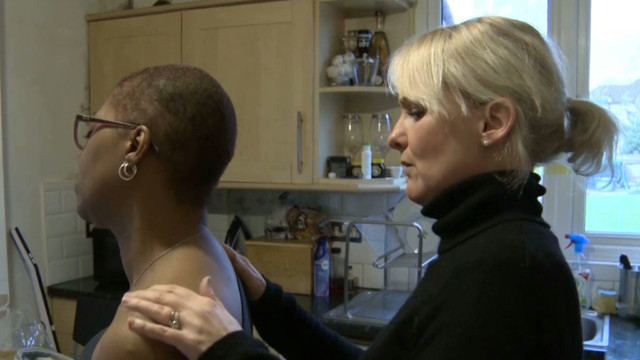Jude Tyson has been suffering from menopausal symptoms since she was 36 – she’s now 55. Jude has experienced severe symptoms including hot flashes and night sweats. She has resorted to wearing black and white clothes, to minimize the embarrassment.
CGTN’s Catherine Drew reports.
“Night sweats are really bad, it affects what I wear, where I go, where I stay, what I do, I don’t do clothes shopping because you can guarantee as soon as I put that clothing on, my body’s going to give out and I’m going to end up sweating in people’s clothes. I don’t like to stay at houses, even my family. Even though they know I’m going to have a major sweat in your bed. Holidays are the same,” said Tyson.
Tyson works as an audiologist testing the hearing of newborn babies on warm hospital wards. She said she has learned to deal with hot flashes at work.
“If I feel it coming, I can be a bit of a devil, I pretend I’ve got a pager in my pocket and I say, ‘I’m sorry I was waiting for a baby, the pager’s just gone off, I’ll be back’ and I’ll go, and then it will take about five minutes, five to seven minutes for the body to calm down,” said Tyson.
Clinical exercise specialist Jane Dowling is helping Jude deal with her symptoms, through diet and exercise. Jane also hosts a blog to help women cope with menopausal symptoms.
“We’ve seen a big shift with women having to work longer than ever before. We’re a higher percentage of the workforce than ever before, but unfortunately women during menopause are not supported in the work place. So we need to go into the workforce and make cultural and leadership changes,” Dowling said.
Government figures suggest the proportion of British women aged 50 to 64 with jobs has risen by more than 50 percent in the past 30 years.
Dowling leads workshops to educate companies and organizations about menopause. She says she’s received great feedback from women who didn’t know how to discuss their needs with their colleagues.
This coincides with research by a team at King’s College London, which concluded there was little awareness of the impact of menopause on working women who are often at the peak of their careers.
Dr. Clare Hardy led the research and said menopausal women reported the need for small changes to make them feel more comfortable.
“Sometimes it can be really simple things. If there are desk fans that they can have on their desks to help them cool down, if they can move their desk next to a window that can be opened, that would be useful. Cold drinking water is something else that women have said would be useful,” Dr. Hardy said.
Dowling said she’s on a mission to help other menopausal women feel they can discuss their needs in the workplace.
“Women have hot flashes. It’s really embarrassing. It’s really quite debilitating, and if someone is having high rate of hot flashes they might think, ‘Crikey, I don’t want to go to work today.’ Then they will stay at home which is not good for their mental health. Then their finances might be affected, so it’s just it’s a domino effect,” Dowling said.
Dowling said employers who are flexible can make all the difference.
Support groups that work with women going through menopause welcome the research and say women must not be afraid to discuss their needs in the workplace. They say companies must support women at this time in their lives if they want to keep their workforce productive.
Chris Bobel discusses paid menstrual leave and the workplace
CGTN’s Rachelle Akuffo spoke with Associate Professor of Women’s Studies Chris Bobel discusses the debate over paid menstrual leave, and how menopause in the workplace is handled.
 CGTN America
CGTN America
